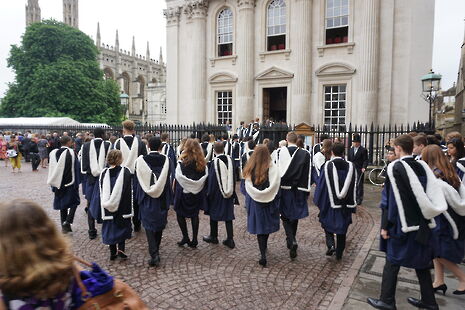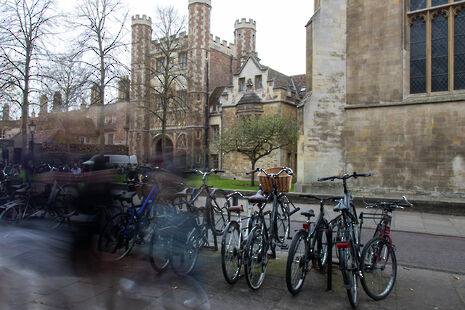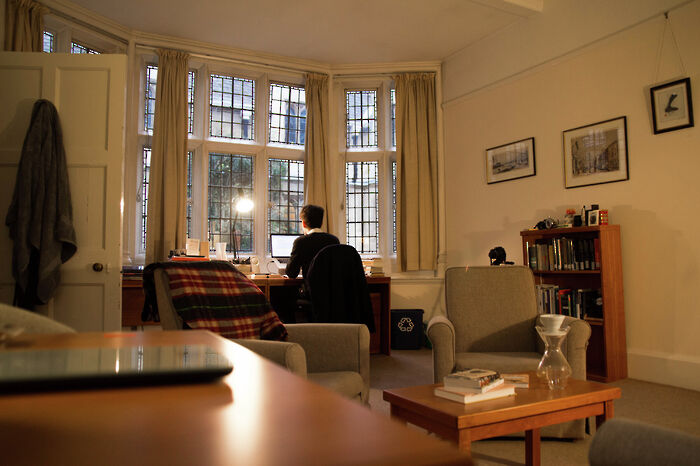Awards for First class students vary dramatically between colleges
Trinity College spent £4.5 million on awards and scholarships last year

Wide discrepancies exist between the benefits that Cambridge colleges offer to students achieving highly in their exams. While some students receive over £500 from their college if they achieve a first, others receive nothing.
Varsity found that the awards made available to Cambridge students in return for high academic achievements were greatly dependent upon the college. Among the most generous colleges is St John’s College, which offers between £400 and £600 to their students that achieve a First. Murray Edwards award scholarships of £400, with Trinity Hall and King’s offering £350.
On the other hand, at Hughes Hall no awards are given for exam attainment. Other colleges offer less than £100 to their academic high-fliers.
College policies on these monetary awards can be complex. They can be awarded as book tokens, cheques or a reduction from college bill. Christ’s College offers a £100 reduction from the Lent term accommodation bill whereas at Gonville & Caius, if you get a First in your second or third year, you’ll receive £100 in book tokens as well as £170 off the following year’s college bill. At many colleges, including Homerton, King’s and Peterhouse, a prize is awarded directly to the student who is free to spend it however they choose.
There are also discrepancies between amounts awarded for specific subject prizes. We found at Magdalene that the prizes for Engineering can be worth as much as twice those for HSPS or Natural Sciences. A student who is successful academically across their degree can earn up to £1500 in subject prizes and college awards. At Selwyn, students who get a First for both of their languages in Part IA of MML are awarded more than those who get a First, but only in one of their languages.
As well as monetary rewards, students who achieve highly may receive preferential treatment in room ballots, be invited to attend scholars’ dinners and to read grace at formal. At many colleges, students achieving a First are admitted as scholars of the college. It is described on the St John’s College website that “being a Scholar means being part of the Foundation of almost 500 years of excellence and tradition”.
At King’s, high achieving students attend an Admission of Scholars ceremony in the chapel followed by a scholars’ dinner hosted by the provost in the provost’s lodge. It is Gonville & Caius’ policy that only the students who achieve Firsts are permitted to read grace at formal hall.
As a previous Varsity investigation revealed, accommodation perks are often offered to First class students, although this practice has recently been removed at several colleges. For those colleges that still offer a scholars’ ballot, general practice is that the students who achieve a First will be bumped up in their position on a random ballot.
Peterhouse offers free vacation residence, in addition to a cash prize and a scholars’ dinner.
At Corpus Christi, 16 rooms are reserved as ‘prize rooms’ for those students who achieve the best results in their exams. The JCR president told Varsity: “All in all, I think our system is pretty fair … There are 278 rooms on offer by College, and the 16 prize rooms are chosen from many different parts of College, meaning that there are more than enough rooms of all shapes and sizes to go around for everybody else.”
Some of the colleges do offer awards to students who achieve highly, but perhaps not achieving a First. This is often called an exhibition rather than a scholarship and the monetary award is smaller. At Selwyn, a student who narrowly misses a First can be nominated by their director of studies for a £30 award. Churchill also offers those who achieve a 2:i, but fall in the top 25% of their cohort, a cash prize of half the value offered to those who achieve a First.
Sidney Sussex employs a slightly different system. Those with results in the top 25% of the cohort are awarded £300, and students who rank between 26% and 35% receive £100.
Colleges’ annual spending on these benefits for scholars can push up into the millions. In 2016, Trinity spent £4.5 million on scholarships and awards, of which £2.8 million was funded through the College’s general funds.
In contrast, Downing spent £501,000 on scholarships and awards in 2016. It is important to note that included within scholarships and awards are payments under the Cambridge Bursary scheme, which amounted to £253,120 in 2016.
The JCR president at Magdalene said: “It seems odd to me that a college which claims it has little money can inject so much into high achieving students, yet is so bureaucratic when offering financial aid to those who need it.”
At Medwards, the JCR commented: “We like the fact that students are rewarded for achieving highly in their subject. However, we also feel that getting a First is not the only representative of hard work, and we’d like to see a rewards system that reflected this.”

Analysis by Sarah Burgess
It seems most students in Cambridge accept that financial awards may incentivise high academic attainment, but it could equally be argued that benefits given to scholars are excessive. The question this begs is whether or not the large sums of money granted to high-achievers can be justified. For many, this is a no, since scholarships and bursaries often come out of the same fund, and it may be the case that the money granted to scholars takes away essential subsidies for students of hardship. However, for many colleges scholarship funds do not impinge on bursary spending, and the awards distributed appear more moderate, with some offering no reward at all.
That said, in some respects, the system of scholar privileges can have another function; primarily as a method of exclusion and punishment. We see this especially in colleges such as Peterhouse, where attendance at an annual benefactors’ dinner is open to everyone except those who receive lower than a 2:i, or in colleges where accommodation ballots reflect performance. A common theme throughout this investigation has been the apparent arbitrariness between college policies regarding high achievement, which may have a lot to do with the wealth of the college itself.
Numerous JCR presidents expressed concerns that their college’s policy is not representative of hard-work, since it doesn’t take into account the conditions under which students received their grades, or the varying thresholds at which Firsts can be obtained across subjects. Ultimately, the question remains: will the University ever be willing to dispense with its obsession with academic perfection, and commit to a policy which works in the interests of all students?
 News / University Council rescinds University Centre membership20 February 2026
News / University Council rescinds University Centre membership20 February 2026 News / Hundreds of Cambridge academics demand vote on fate of vet course20 February 2026
News / Hundreds of Cambridge academics demand vote on fate of vet course20 February 2026 News / Judge Business School advisor resigns over Epstein and Andrew links18 February 2026
News / Judge Business School advisor resigns over Epstein and Andrew links18 February 2026 News / Caius students fail to pass Pride flag proposal20 February 2026
News / Caius students fail to pass Pride flag proposal20 February 2026 News / Union cancels event with Sri Lankan politician after Tamil societies express ‘profound outrage’20 February 2026
News / Union cancels event with Sri Lankan politician after Tamil societies express ‘profound outrage’20 February 2026










